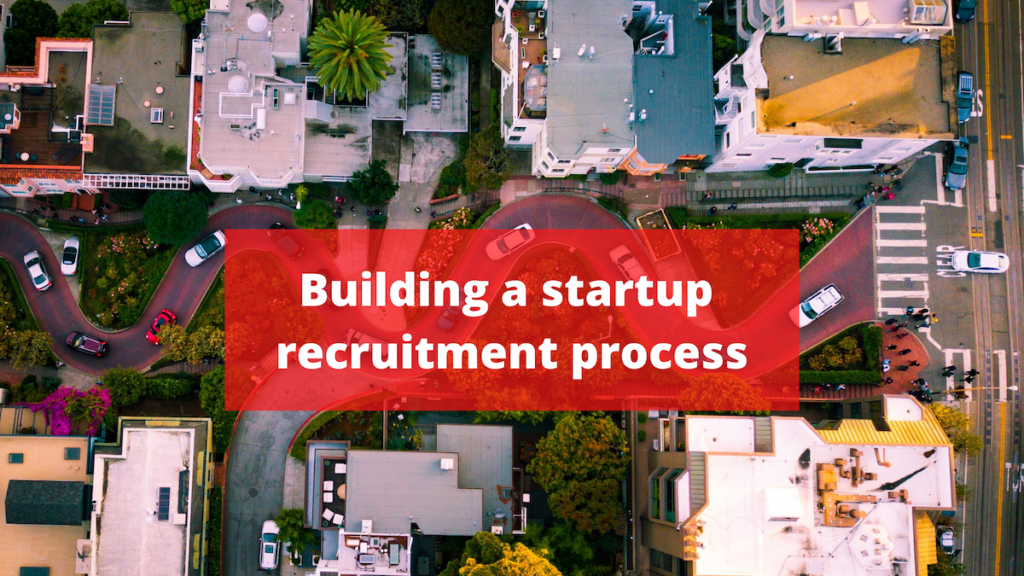- 9.02.2022
While recruiting tends to be one of the most important tasks of startup founders, most founders are not recruiters. While on the surface recruiting is rather simple – you interview people and try to hire the best ones – there’s quite a lot to actually doing it systematically and properly. Having a defined process and playbook helps you among other things to avoid bias, to assess objectively and to maintain a good employer brand. Here are a few things to get started with when you want to evolve your startup recruitment process into a more professional one.
Keeping it clean and concise
Companies nowadays are getting a lot of flack for making their candidates jump through hoops. Don’t be one of those companies! Instead, before you post a vacancy, start by defining your recruitment process. For instance, in terms of candidate interaction, a simple yet adequate process in most cases could consist of a quick screening and two interviews. One of the interviews could be more general, while the other one could focus on the skills needed (e.g. tech). Not equivalent to a full-time job for the candidate to participate in, yet you should still be getting an adequate amount of information to make a decision.
When trying to keep your startup recruitment process concise like the above example, you might have doubts. The temptation of organizing more interviews may creep in. But think carefully. Once you go past the initial two interviews, the marginal benefit of doing more of the same becomes thinner and thinner. On the other hand, if you’re on the fence about a candidate an extra interview usually won’t help either. So keep it clean.
Set a timeline for processing and decisions
When you’re hiring, you should come up with a schedule for your startup recruitment process. Some of the schedule items, such as application deadlines will be visible to the candidates, but most won’t. Yet you should set those internal deadlines, and also communicate them to the candidates when applicable. Often the best way to end an interview is to let the candidates know about potential next steps and when they will hear from you again. Don’t ghost candidates – they probably won’t come around again!
Timelines and deadlines are also important for processing applications. If you’re planning to keep a role open for a month, you might want to set a weekly or a bi-weekly schedule to process new applications. Promptly reject the ones you won’t move forward. There’s no use to keep them in the funnel if you can see right away that they won’t be the ones. Rapid – but of course considerate and decent – rejection is something that candidates also appreciate. There’s no need to manufacture yourself into one of those horror stories where rejection letters arrive six months after applying.
Communicate throughout the recruitment process
A recruitment process – let alone a startup recruitment process – probably never goes wrong because you communicate too much. On the contrary, it’s very easy to lose candidates during the process if you don’t communicate, especially if things take unexpected turns.
By default, you should keep the candidates continuously posted on what’s going on. They should always know what the next steps are and the timeline for them. If you’ve built the timeline, this won’t be all that difficult.
However, things go sideways relatively often, especially in the startup world. Maybe you have a delay in wrapping up a round of funding or maybe your next launch is getting postponed. Or you’re just putting out fires and fighting to keep the company alive. These things happen. But keep the candidates in the loop. It’s much nicer from the candidate’s perspective to receive a message saying “sorry we are taking a bit longer than expected” than to receive no message at all.
Bonus: leave the door open for potential future hires
As a startup, recruiting is expensive for you. Not necessarily financially, but the time investment is always significant. Therefore, if your startup recruitment process yields more good candidates than you can hire at a given time, make sure to keep track of them. You might also find candidates that are not what you’re looking for right now, but could be perfect matches for roles that you’re expecting to need to open in the future. Keep good track of those as well.
In fact, in addition to just keeping track of such candidates, leave the door open and communicate it. Candidates mostly do understand that time and place are always factors too, and you not being able to hire them right now doesn’t immediately mean that you wouldn’t be happy to hire them in general. If you can build such a pipeline of candidates, you’ll save a lot of effort in the long run.
Learn more about startup recruitment

How to Work With an Agency
Generally speaking, some companies might not want to use a recruiting agency because they assume they would mainly provide candidates for either entry-level or temporary

How to Hire Foreign Remote Talent for Your Startup
The ongoing global pandemic has brought about a sudden realization that remote work can actually work. Consequently, startups seem to be increasingly open to hiring

How to plan, adapt and find funding for your startup in the pandemic economy
A Startup is a beautiful thing. It very often contains innovation, ideas, dreams and ambitions. But it also means heavy efforts, high risks, uncertainty and

Onboarding Remotely in a Startup
Onboarding plays an absolutely crucial role in a new hire’s success and happiness, and consequently on their productivity and fitting to the Team. A good

7-Step Checklist for Writing a Perfect Job Description for a Startup
What are the best practises when it comes to writing a perfect job description for a startup? A general misconception is that a job description

Interviewing Candidates for Your Startup – Tips for Founders
If you’ve started a startup and got going, chances are that you have come across one of the biggest bottlenecks in any startup’s growth –
Download Free E-Book on Startup Recruitment

Author of this post


